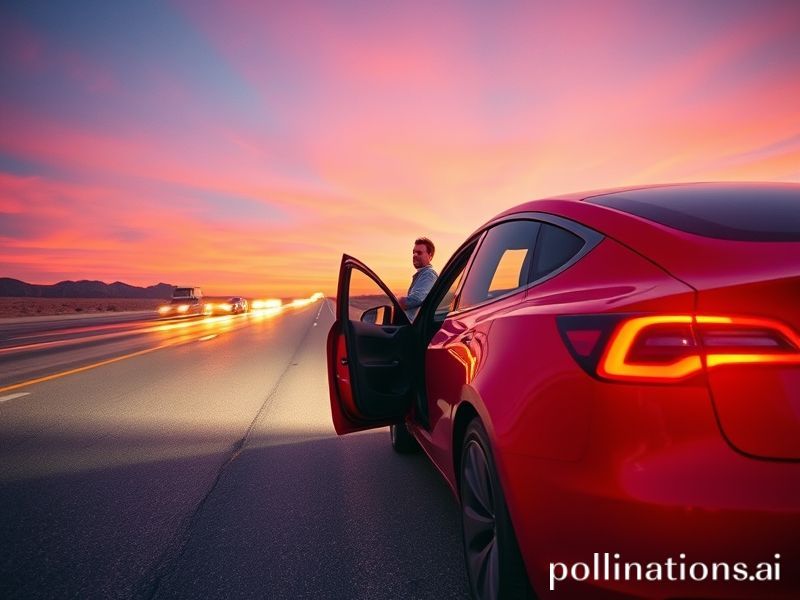Tesla Takes the Wheel: How One Car Company Became the Planet’s Favorite Climate Guilt Trip
Tesla: The Car That Conquered the World While Barely Paying Rent on Reality
By “World-Weary” Correspondent, filing from the smoking crater formerly known as Common Sense
PARIS—When the Eiffel Tower lit up in electric blue last month to celebrate Tesla’s record quarterly deliveries, French environmentalists staged a protest by chaining themselves to croissants. The stunt failed—mostly because the croissants were eaten by gendarmes on break—but the symbolism stuck: Tesla has become the planet’s favorite guilty pleasure, the automotive equivalent of a smoke break during a climate summit.
From São Paulo to Shanghai, the Model 3 is now the iPhone of asphalt: sleek, overpriced, and guaranteed to make the neighbors feel inadequate. In Norway, where oil money bankrolls EV subsidies the way medieval popes bankrolled indulgences, one in every four new cars is a Tesla. Meanwhile, in Indonesia, officials proudly unveil a nickel-to-battery supply chain that will supposedly lift 200,000 people out of poverty without mentioning the bit about deforestation, sulfuric rivers, or the occasional child miner who thinks “ESG” is a new Pokémon.
Tesla’s global conquest rests on a simple equation: take a lithium-ion battery, wrap it in the myth of Silicon Valley exceptionalism, and sell the package to governments desperate to look green without touching their coal budgets. Germany, having spent decades lecturing the world on diesel virtue, now hands out €6,000 sweeteners so citizens can trade in their soot-belching Golfs for a car whose carbon footprint is conveniently calculated in Fremont, California, by people who’ve never seen a lignite mine.
In China, Tesla’s Shanghai Gigafactory is the envy of every multinational: built in 168 working days, subsidized by local governments that bulldoze ancestral graveyards with Confucian efficiency, and staffed by workers whose non-disclosure agreements are rumored to be written on rice paper so they dissolve in tears. The plant produces more cars per square meter than any factory in history, a triumph of vertical integration and horizontal propaganda. State media calls it “socialism with Tesla characteristics”; Elon Musk calls it “the future”; the workers call it Tuesday.
The geopolitics are equally electric. When Washington slapped tariffs on Chinese batteries last year, Beijing retaliated by threatening to restrict graphite exports—graphite being the anode material that lets Tesla owners virtue-signal from Oslo to Oklahoma. The standoff lasted 48 hours, roughly the time it took for lobbyists to remind both sides that global supply chains, like unhappy families, are dysfunctional in their own special way but impossible to leave without couch-surfing in the Stone Age.
Yet for all the hand-wringing, Tesla keeps winning. In India, where cows still hold up traffic on national highways, the government just slashed import duties to 15% for any EV maker willing to build a factory. Translation: “We hate foreign cars, but we hate choking on Delhi smog slightly more.” Analysts predict Tesla will accept, provided it can negotiate a tax holiday longer than the average Indian monsoon and shorter than the average Indian court case.
Critics warn of a single-point-of-failure civilization: if Musk decides tomorrow that Mars needs dealerships more than Mumbai, entire national grids could wobble. The Europeans, ever the continent that brought you both the Enlightenment and trench warfare, have responded by subsidizing 47 different battery startups, 46 of which will collapse by Christmas, leaving the remaining one to be bought quietly by Tesla for pocket change and a crate of Dogecoin.
At heart, Tesla is less a car company than a global mood ring: in Norway it’s a climate halo, in China a ticket to the middle class, in America a rolling culture-war bumper sticker. It proves we want absolution without penance, innovation without regulation, and lithium without the Bolivian salt flats—though we’ll take those too, preferably on a 30-year lease with free shipping.
So the next time a silent Model Y glides past your café table, note the paradox: the world is literally burning, and our best answer is a very fast sofa running on rocks dug up by underpaid teenagers. Progress, like Tesla’s Autopilot, is always just a software update away—until it isn’t.







